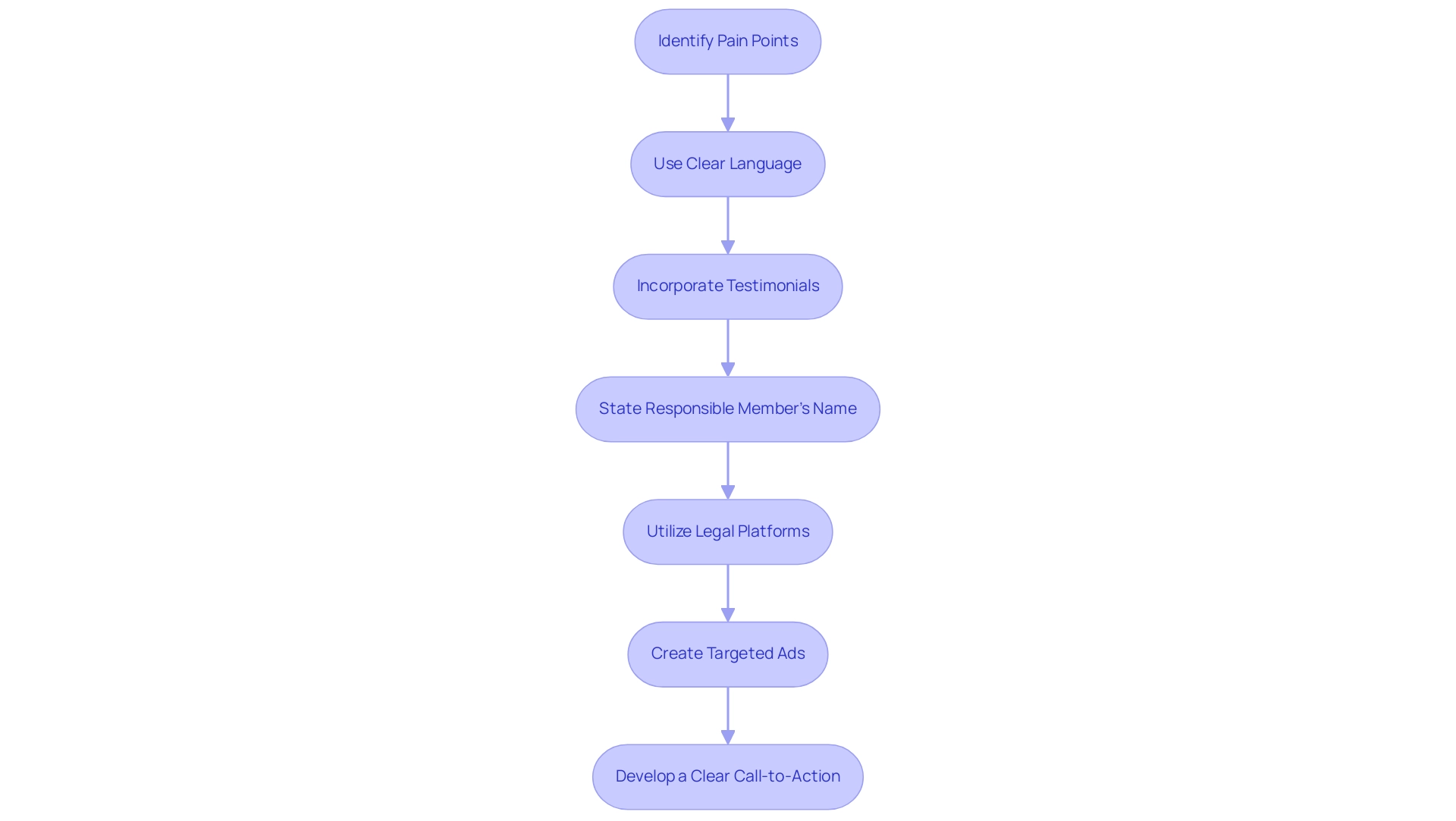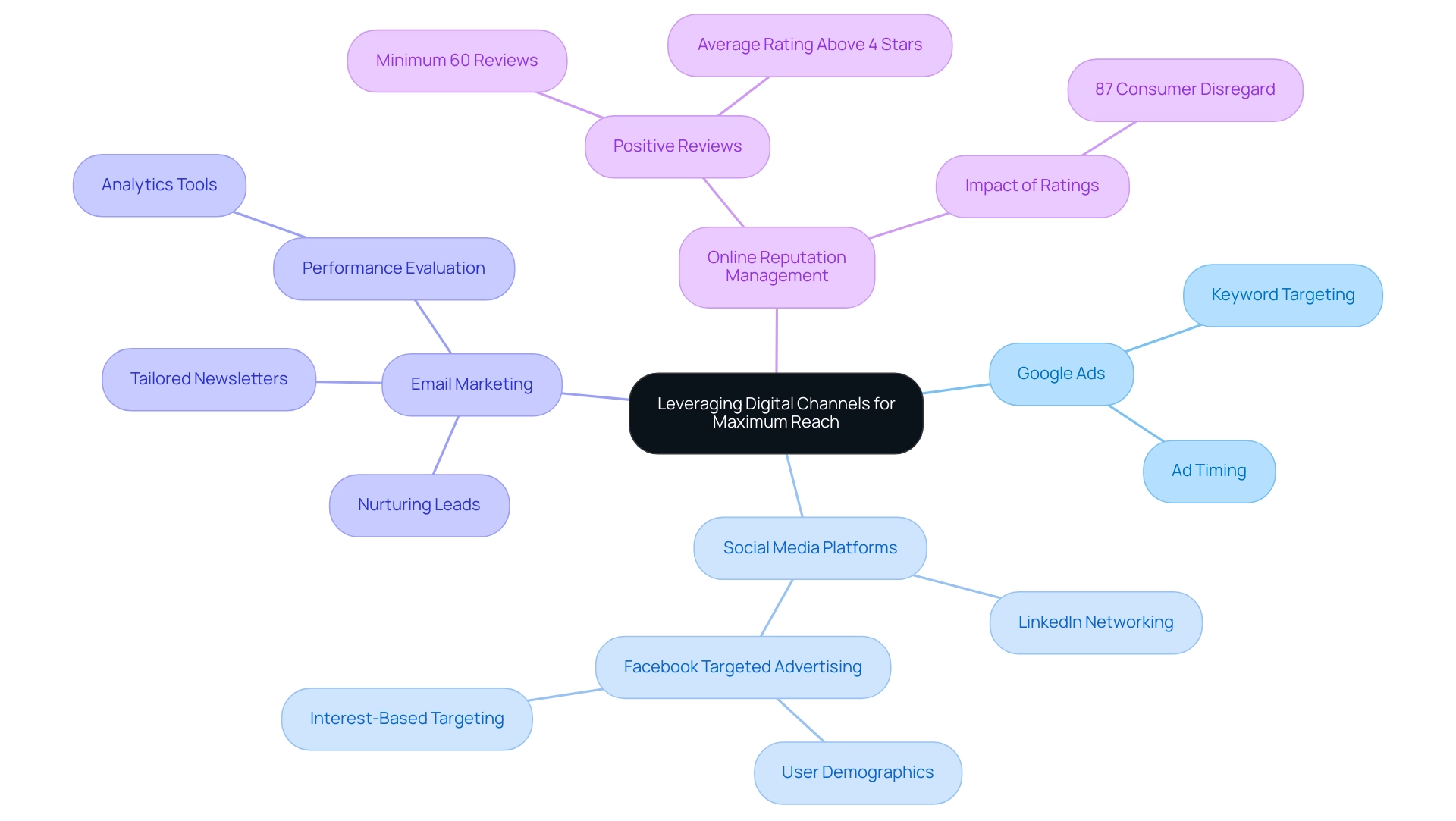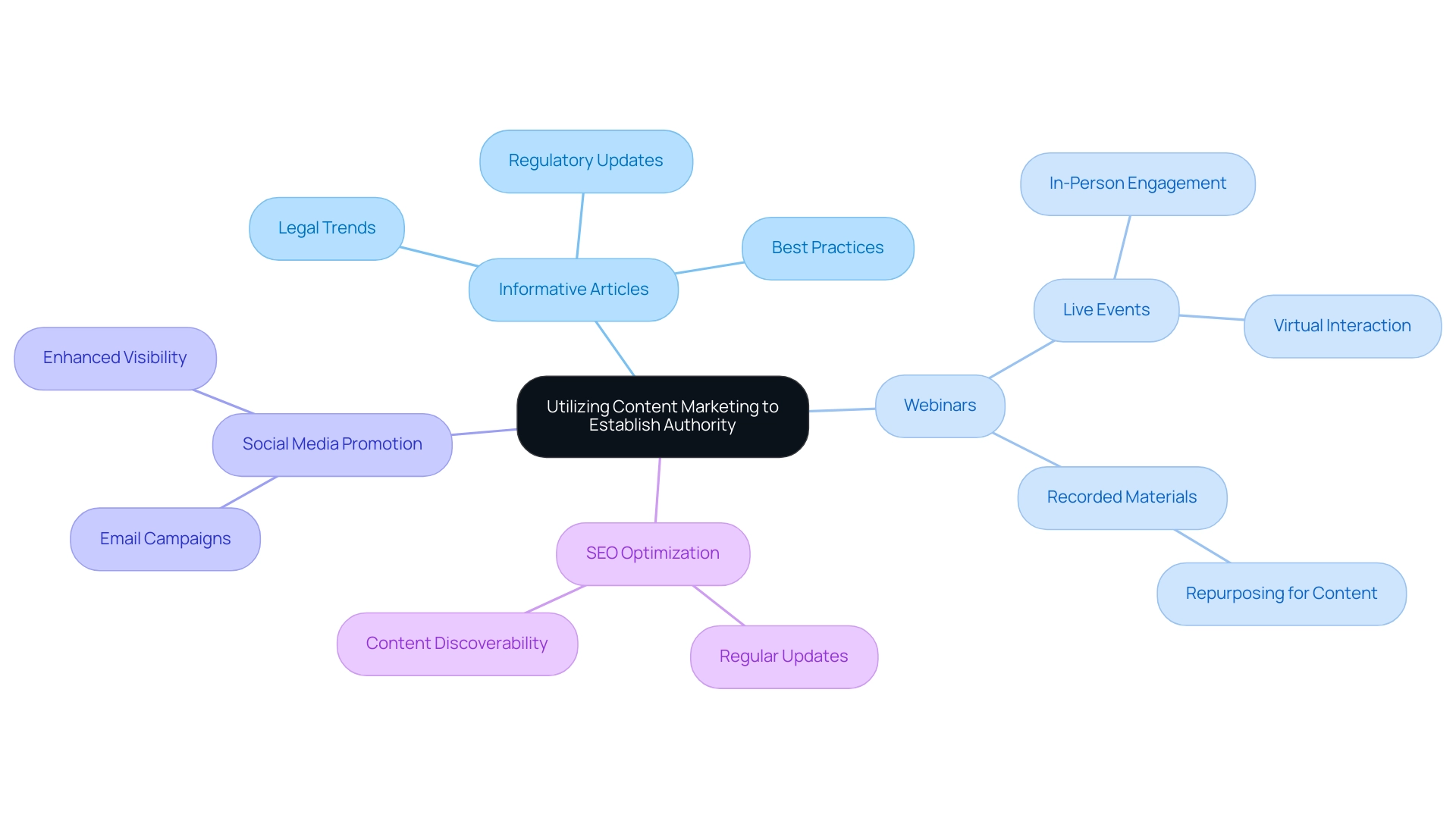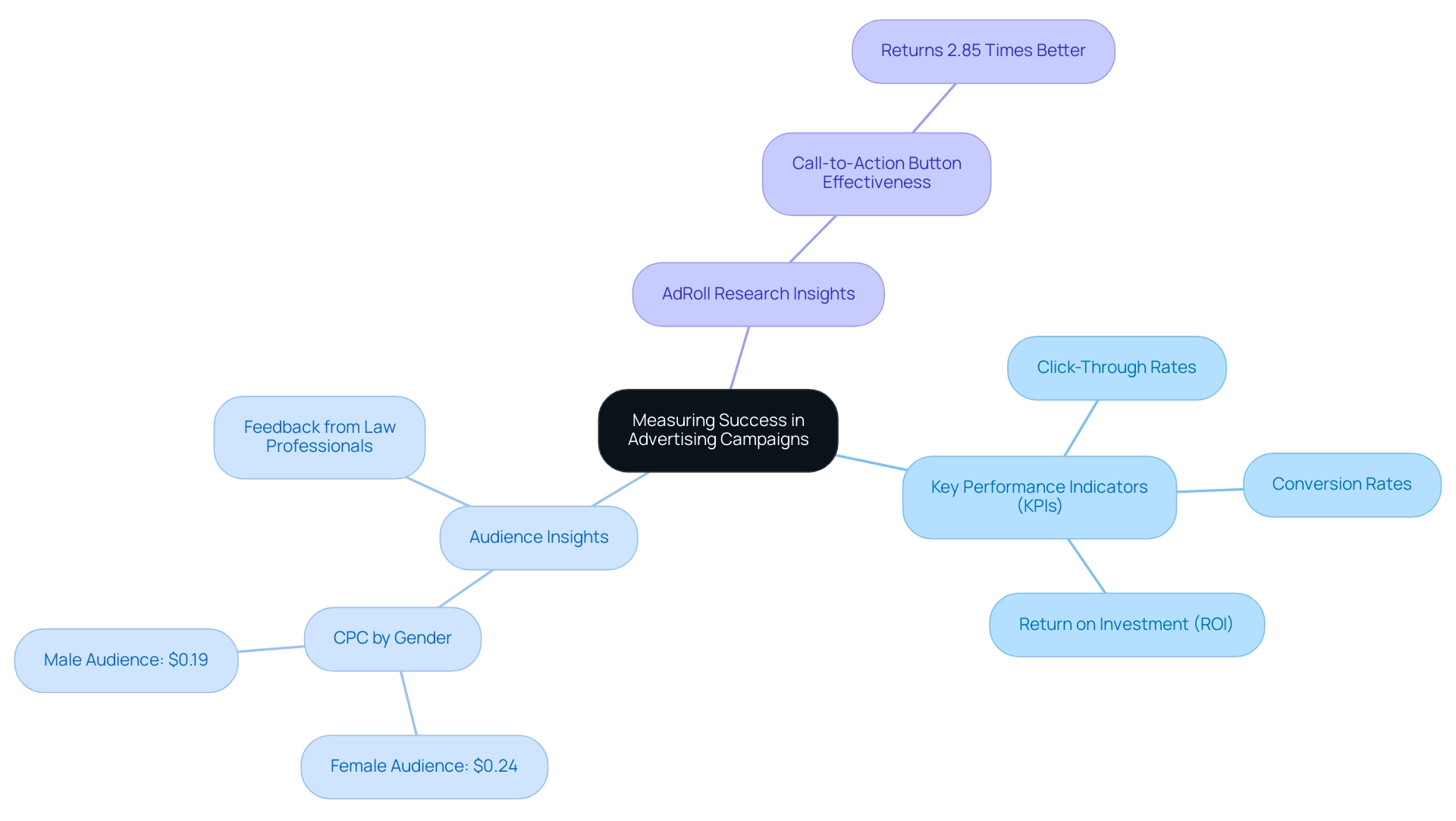Introduction
In the competitive landscape of legal marketing, understanding the unique needs and preferences of legal professionals is paramount for success. This article outlines essential strategies that marketers can adopt to effectively engage this audience, from identifying specific legal niches to leveraging digital channels and content marketing. By focusing on tailored advertising messages and utilizing data analytics, firms can enhance their outreach and establish themselves as trusted authorities within the legal community.
Additionally, the importance of measuring campaign success through clear metrics ensures that marketing efforts remain relevant and impactful. As the legal sector continues to evolve, these insights provide a roadmap for marketers aiming to connect with legal professionals effectively.
Fundamental Strategies for Targeting Legal Professionals
To effectively engage industry experts, marketers should implement a targeted approach that focuses on several essential strategies. Initially, it is crucial to identify specific areas of law, such as personal injury, family law, or corporate law, as each niche possesses distinct needs and preferences that should shape your marketing approach. Next, prioritize utilizing platforms where attorneys are predominantly active, including LinkedIn, forums, and professional networks.
Creating captivating material that tackles the unique challenges encountered by attorneys—such as case management and client acquisition—can establish your brand as a thought leader in the law sector. Furthermore, leveraging data analytics to gain insights into the behavior of your target audience is vital; this approach can enhance ad placements and significantly improve engagement rates. For example, 66% of video promoters state that video has assisted in decreasing support inquiries, suggesting the possible efficacy of video content in strategy development.
A case study titled ‘Reduction of Support Queries through Video’ highlights that this reduction in support queries is noted as an all-time high, reflecting the growing effectiveness of video in customer support. Lastly, adherence to legal advertising regulations is paramount to avoid potential pitfalls that could undermine your reputation. As one expert aptly noted,
But brands must remember the importance of the human touch in crafting and telling compelling stories.
This human element is particularly important in fostering genuine connections with potential clients. Additionally, companies should be aware that many are not fully utilizing the advanced measurement capabilities of data clean rooms, which could provide valuable insights for enhancing promotional strategies.

Tailoring Advertising Messages to Meet Lawyers’ Needs
To effectively tailor advertising to lawyers, it is imperative to focus on how your services address their specific pain points. For instance, when promoting a case management software solution, underscore its efficiency and time-saving advantages. Employ clear, jargon-free language that acknowledges their expertise while directly addressing their needs.
Incorporating testimonials from fellow lawyers or presenting case studies showcasing successful outcomes can significantly bolster the credibility of your claims. For example, Andrew P. Lannon of Lannon Land Litigation Local Law, PLLC, shared that after integrating Justia into his marketing efforts, he successfully secured a substantial institutional client with multiple active cases. This case not only illustrates the potential of tailored advertising to lawyers but also highlights the effectiveness of utilizing targeted ads.
Additionally, it’s essential to remember that any communication made on behalf of a law firm must state the name of at least one member responsible for it, which is crucial for adherence in advertising. Consider utilizing platforms such as Justice and the Legal Information Institute (LII), which enable attorneys to claim and finalize their profiles at no cost, boosting their visibility and credibility. Create advertisements that align with the interests of your audience, such as providing a white paper on recent developments in the law to engage lawyers eager to stay informed.
Finally, your call-to-action should be straightforward and compelling, guiding potential clients toward the next step without ambiguity.

Leveraging Digital Channels for Maximum Reach
To effectively engage professionals in law, it is essential to leverage a variety of digital channels, including:
- Advertising to lawyers through Google Ads
- Social media platforms
- Email marketing
Google Ads enables accurate targeting through specific keywords that practitioners are likely to search for, which is essential for effective advertising to lawyers, ensuring that your advertisements are displayed at the opportune moment. Platforms such as LinkedIn serve as invaluable tools for networking and disseminating valuable content, while Facebook offers the capability for targeted advertising campaigns based on user demographics and interests.
Furthermore, email promotion emerges as a potent strategy for nurturing leads, especially when it involves advertising to lawyers; through newsletters, you can provide insights and resources tailored to the needs of legal professionals. Ongoing evaluation of campaign performance through analytics tools is essential for enhancing your promotional strategy, especially in the context of advertising to lawyers, as it guarantees that your communications effectively reach the intended audience. Considering that 87% of consumers will disregard any service with an online rating lower than 4 out of 5, maintaining a strong online presence, including a robust review portfolio, is essential to your digital strategy.
For professionals in the field, this means striving for at least 60 positive online reviews to enhance credibility and attract potential clients. Furthermore, the case study on promotional strategies emphasizes how combining materials with paid digital media can serve clients’ long-term interests, demonstrating that promotion should be regarded as an asset rather than a cost. This comprehensive strategy guarantees that all promotional efforts, particularly advertising to lawyers, collaborate for sustained growth in the competitive field of law.

Utilizing Content Marketing to Establish Authority
Establishing influence through advertising to lawyers is essential for capturing the interest of law practitioners. Creating informative articles, whitepapers, and case studies that delve into legal trends, best practices, and regulatory updates not only highlights your expertise but also positions your brand as a vital resource for the legal community. In 2024, it is particularly beneficial for law firms to engage in hosting webinars and online workshops, which allow for direct interaction with the audience.
This approach not only facilitates the addressing of specific questions but also provides an avenue for sharing valuable insights. As Casey Meraz, CEO of Juris Digital, aptly states,
We help you tell a story that resonates—one where your clients are the heroes, and your firm is the trusted advisor guiding them to success.
Promoting this material through social media and email campaigns significantly enhances visibility and reach. Moreover, regularly updating and optimizing material for SEO ensures its relevance and discoverability by potential clients. Recent statistics demonstrate that effective content marketing strategies, including advertising to lawyers through participation in webinars and workshops, are paramount for establishing authority in marketing for the profession.
For instance, personal injury attorneys can share valuable knowledge through live events, both in-person and virtual, fostering interaction and establishing themselves as knowledgeable and approachable professionals. This case study illustrates how hosting live events can effectively engage the community and enhance a law firm’s reputation.
Additionally, the key point regarding Jason Waechter, known as ‘The Motorcycle Lawyer,’ emphasizes the value of conference speaking in establishing authority in the field of law. Furthermore, recorded webinars and workshop materials can be repurposed as content for your website, social media, and newsletters, demonstrating their ongoing value. By adopting these practices, law firms can effectively position themselves as knowledgeable and trusted entities within the judicial landscape.

Measuring Success and Optimizing Campaigns
Measuring the success of advertising campaigns requires the establishment of clear key performance indicators (KPIs) that align with your specific goals. Essential metrics to monitor include:
- Click-through rates
- Conversion rates
- Return on investment (ROI)
For instance, AdRoll’s research highlights that Facebook ads featuring a call-to-action button can yield returns up to 2.85 times better than those without.
Furthermore, in Q4 2016, the average cost-per-click (CPC) for female audiences was $0.24, compared to $0.19 for male audiences. This data suggests that advertisers may need to adjust their strategies based on gender targeting to optimize costs. Utilizing analytics tools like Google Analytics can provide critical insights into website traffic and user behavior, enabling real-time assessment of campaign effectiveness.
Moreover, collecting feedback from law professionals can provide valuable insights into their experiences and perceptions concerning advertising to lawyers efforts. By analyzing this data, you can optimize your campaigns through adjustments in messaging, targeting, or platform selection. Continuous improvement is vital for maintaining relevance and effectiveness in the highly competitive legal market, particularly as trends evolve and new metrics for measuring success emerge in 2024.

Conclusion
Implementing effective legal marketing strategies is essential for engaging legal professionals in today’s competitive landscape. Marketers must prioritize understanding the unique needs of various legal niches, utilizing targeted digital channels, and crafting tailored advertising messages that resonate with lawyers. By focusing on the specific challenges faced by legal practitioners and leveraging data analytics, firms can enhance their outreach and establish themselves as trusted authorities in the legal community.
The importance of content marketing cannot be overstated. By creating valuable resources such as articles, webinars, and case studies, brands can position themselves as thought leaders while fostering genuine connections with their audience. Moreover, maintaining a strong online presence through positive reviews and continuous content optimization is crucial for credibility and visibility.
Lastly, measuring the success of marketing campaigns through clear metrics ensures that strategies remain relevant and effective. As the legal sector continues to evolve, marketers must adapt their approaches, focusing on continuous improvement to meet the changing demands of legal professionals. Embracing these strategies will not only enhance engagement but also drive long-term success in the legal marketing arena.

